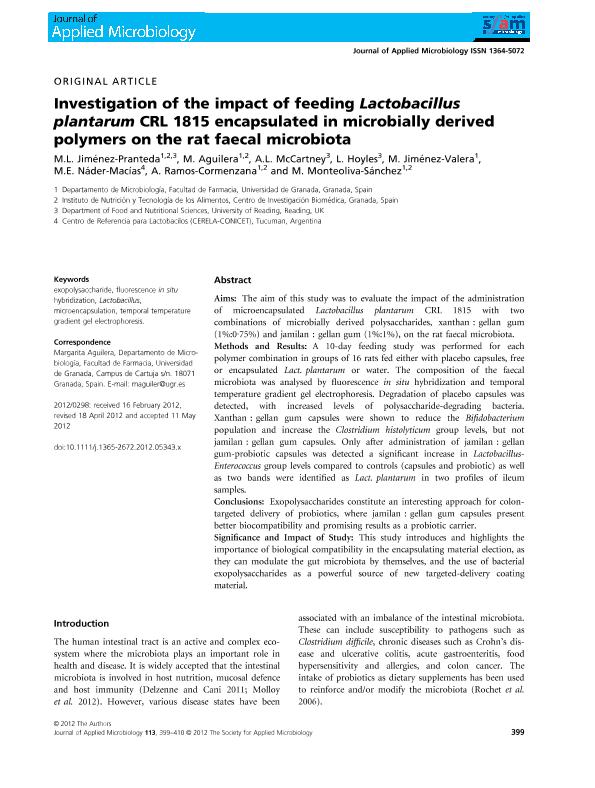Artículo
Investigation of the impact of feeding Lactobacillus plantarum CRL 1815 encapsulated in microbially derived polymers on the rat faecal microbiota
Jiménez Pranteda, María Luján; Aguilera, Margarita; Mc Cartney, Anne; Hoyles, Lesley; Jiménez-Valera, Maria; Nader, Maria Elena Fatima ; Ramos Cormenzana, Alberto; Monteoliva Sánchez, Mercedes
; Ramos Cormenzana, Alberto; Monteoliva Sánchez, Mercedes
 ; Ramos Cormenzana, Alberto; Monteoliva Sánchez, Mercedes
; Ramos Cormenzana, Alberto; Monteoliva Sánchez, Mercedes
Fecha de publicación:
08/2012
Editorial:
Wiley Blackwell Publishing, Inc
Revista:
Journal of Applied Microbiology
ISSN:
1364-5072
e-ISSN:
1365-2672
Idioma:
Inglés
Tipo de recurso:
Artículo publicado
Clasificación temática:
Resumen
AIMS: The aim of this study was to evaluate the impact of the administration of microencapsulated Lactobacillus plantarum CRL 1815 with two combinations of microbially derived polysaccharides, xanthan : gellan gum (1%:0·75%) and jamilan : gellan gum (1%:1%), on the rat faecal microbiota.
METHODS AND RESULTS: A 10-day feeding study was performed for each polymer combination in groups of 16 rats fed either with placebo capsules, free or encapsulated Lact. plantarum or water. The composition of the faecal microbiota was analysed by fluorescence in situ hybridization and temporal temperature gradient gel electrophoresis. Degradation of placebo capsules was detected, with increased levels of polysaccharide-degrading bacteria. Xanthan : gellan gum capsules were shown to reduce the Bifidobacterium population and increase the Clostridium histolyticum group levels, but not jamilan : gellan gum capsules. Only after administration of jamilan : gellan gum-probiotic capsules was detected a significant increase in Lactobacillus-Enterococcus group levels compared to controls (capsules and probiotic) as well as two bands were identified as Lact. plantarum in two profiles of ileum samples.
CONCLUSIONS: Exopolysaccharides constitute an interesting approach for colon-targeted delivery of probiotics, where jamilan : gellan gum capsules present better biocompatibility and promising results as a probiotic carrier.
SIGNIFICANCE AND IMPACT OF STUDY: This study introduces and highlights the importance of biological compatibility in the encapsulating material election, as they can modulate the gut microbiota by themselves, and the use of bacterial exopolysaccharides as a powerful source of new targeted-delivery coating material.
Archivos asociados
Licencia
Identificadores
Colecciones
Articulos(CERELA)
Articulos de CENTRO DE REFERENCIA PARA LACTOBACILOS (I)
Articulos de CENTRO DE REFERENCIA PARA LACTOBACILOS (I)
Citación
Jiménez Pranteda, María Luján; Aguilera, Margarita; Mc Cartney, Anne; Hoyles, Lesley; Jiménez-Valera, Maria; et al.; Investigation of the impact of feeding Lactobacillus plantarum CRL 1815 encapsulated in microbially derived polymers on the rat faecal microbiota; Wiley Blackwell Publishing, Inc; Journal of Applied Microbiology; 113; 2; 8-2012; 399-410
Compartir
Altmétricas



